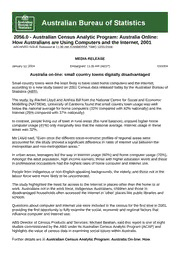
ABS Census 2001, Australia On-Line - Small Country Towns Digitally Disadvantaged, 2001 (Media Release) PDF
Preview ABS Census 2001, Australia On-Line - Small Country Towns Digitally Disadvantaged, 2001 (Media Release)
2056.0 - Australian Census Analytic Program: Australia Online: How Australians are Using Computers and the Internet, 2001 ARCHIVED ISSUE Released at 11:30 AM (CANBERRA TIME) 12/01/2004 MEDIA RELEASE January 12, 2004 Embargoed: 11:30 AM (AEST) 03/2004 Australia on-line: small country towns digitally disadvantaged Small country towns were the least likely to have used home computers and the Internet, according to a new study based on 2001 Census data released today by the Australian Bureau of Statistics (ABS). The study, by Rachel Lloyd and Anthea Bill from the National Centre for Social and Economic Modelling (NATSEM), University of Canberra found that small country town usage was well below the national average for home computers (32% compared with 42% nationally) and the Internet (25% compared with 37% nationally). In contrast, people living out of town in rural areas (the rural balance), enjoyed higher home computer usage (41%) only marginally less that the national average. Internet usage in these areas was 32%. Ms Lloyd said, "Even once the different socio-economic profiles of regional areas were accounted for, the study showed a significant difference in rates of Internet use between the metropolitan and non-metropolitan areas." In urban areas, teenagers led the way in Internet usage (60%) and home computer usage (70%). Amongst the adult population, high income earners, those with higher education levels and those in professional occupations had the highest rates of home computer and Internet use. People from Indigenous or non-English speaking backgrounds, the elderly, and those not in the labour force were more likely to be unconnected. The study highlighted the need for access to the Internet in places other than the home or at work. Australians not in the work force, Indigenous Australians, children and those in disadvantaged households often accessed the Internet in 'other' places like public libraries and schools. Questions about computer and Internet use were included in the census for the first time in 2001, providing the first opportunity to fully examine the social, economic and regional factors that influence computer and Internet use. ABS Director of Census Products and Services, Michael Beahan, said this report is one of eight studies commissioned by the ABS under its Australian Census Analytic Program (ACAP) and highlights the value of census data in examining social issues within Australia. Further details are in Australian Census Analytic Program: Australia On-line: How Australians are Using Computers and the Internet (cat. no. 2056.0). This page last updated 8 December 2006 © Commonwealth of Australia All data and other material produced by the Australian Bureau of Statistics (ABS) constitutes Commonwealth copyright administered by the ABS. The ABS reserves the right to set out the terms and conditions for the use of such material. Unless otherwise noted, all material on this website – except the ABS logo, the Commonwealth Coat of Arms, and any material protected by a trade mark – is licensed under a Creative Commons Attribution 2.5 Australia licence
